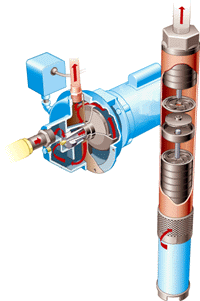Well Information

Properly constructed private water supply systems generally
require little routine maintenance. These simple steps will
help protect your system and investment.
- Always use qualified water well drillers and pump installers
when a well is constructed, or when a pump is installed,
or the system is serviced.
- An annual well maintenance check, including a bacterial
test, is recommended. Any source of drinking water should
be checked any time there is a change in taste, odor or appearance,
or anytime a water supply system is serviced.
- Keep hazardous chemicals, such as paint, fertilizer, pesticides,
and motor oil far away from your well. These materials should
be properly disposed.
- Periodically check the well sanitary cap located at the
top of the well casing to ensure it is secure and in good
repair.
- Always maintain proper separation between your well and
buildings, waste systems or chemical storage facilities.
Your professional contractor should know the rules.
- Don't allow back-siphonage. When mixing pesticides, fertilizers
or other chemicals, don't put the hose inside the tank or
container. Check valves or anti-siphon devices should always
be used on outside hose bibs.
- When landscaping, keep the top of your well at least one
foot above the ground. Slope the ground away from your well
for proper drainage.
- Take care in working or mowing around your well. A damaged
casing could jeopardize the sanitation of your well. Don't
pile snow, leaves, or other materials around your well.
- Keep your well records in a safe place. These should include
the construction report, as well as a history of water well
system maintenance and water testing results.
- Be aware of changes in your well, the area around your
well, or the water it provides.
- If there is a noticeable decrease in water volume, you
should contact your well service provider without delay.
|
